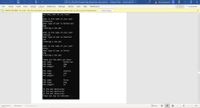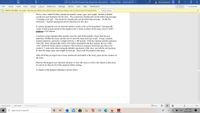
can I get help writing this in C++ following these guidelines
|
Executes without crashing |
|
Appropriate Internal Documentation |
|
Pet Class |
|
Data members: name, type, weight |
|
Constructor/destructor |
|
Getters/setters as appropriate |
|
Main: The following items must be implemented in main() or by functions called from main() They must not be implemented in the Pet class |
|
Prompts user for the number of pets |
|
Creates the pet array using dynamic memory allocation |
|
Dynamically creates a pet object |
|
Generates a random weight (between 1-100 inclusive) for each pet |
|
Seed is 100 |
|
Prints contents of array as illustrated in diagram |
|
De-allocates memory (both the array and the contents of the array) before exiting |
|
Style: |
|
Modular design, no global variables, etc. |


Step by stepSolved in 3 steps with 5 images

- What are some ways in which a reference and a pointer are alike?arrow_forwardWhat are the three things that you are required to perform for classes that include member variables that are pointers?arrow_forwardWhat are the three tasks you must do for classes that include member variables that are pointers?arrow_forward
- /* Interface File: Movie.h Declaration of Movie Class (Variables - "Data Members" or "Attributes" AND Functions - "Member Functions" or "Methods") */ #ifndef MOVIE_H // Include Guard or Header Guard -If already defined ignore rest of code #define MOVIE_H // Otherwise, define MOVIE_H #include<string> // Note: Not "using namespace std;" or even "using std::string" class Movie { private: std::string title = ""; // Explict scope used --> std::string int year = 0; public: Movie(std::string title = "", int year = 1888); // Declaring a Default Constructor ~Movie(); // A Destructor used for freeing up resources void set_title(std::string title_param); std::string get_title() const; // "const" safeguards class variable changes within function std::string get_title_upper() const; void set_year(int year_param); int get_year() const; }; //…arrow_forwardC++ Array Expander -Just do everything in main and make sure you comment each step Use Pointer Notation for the function and within the function. Use a main function and return the pointer from the ArrayExpander function to mainarrow_forwardcreate using c++ One problem with dynamic arrays is that once the array is created using the new operator the size cannot be changed. For example, you might want to add or delete entries from the array similar to the behavior of a vector . This project asks you to create a class called DynamicStringArray that includes member functions that allow it to emulate the behavior of a vector of strings. The class should have the following A private member variable called dynamicArray that references a dynamic array of type string. A private member variable called size that holds the number of entries in the array. A default constructor that sets the dynamic array to NULL and sets size to 0. A function that returns size . A function named addEntry that takes a string as input. The function should create a new dynamic array one element larger than dynamicArray , copy all elements from dynamicArray into the new array, add the new string onto the end of the new array, increment size, delete the…arrow_forward
 Database System ConceptsComputer ScienceISBN:9780078022159Author:Abraham Silberschatz Professor, Henry F. Korth, S. SudarshanPublisher:McGraw-Hill Education
Database System ConceptsComputer ScienceISBN:9780078022159Author:Abraham Silberschatz Professor, Henry F. Korth, S. SudarshanPublisher:McGraw-Hill Education Starting Out with Python (4th Edition)Computer ScienceISBN:9780134444321Author:Tony GaddisPublisher:PEARSON
Starting Out with Python (4th Edition)Computer ScienceISBN:9780134444321Author:Tony GaddisPublisher:PEARSON Digital Fundamentals (11th Edition)Computer ScienceISBN:9780132737968Author:Thomas L. FloydPublisher:PEARSON
Digital Fundamentals (11th Edition)Computer ScienceISBN:9780132737968Author:Thomas L. FloydPublisher:PEARSON C How to Program (8th Edition)Computer ScienceISBN:9780133976892Author:Paul J. Deitel, Harvey DeitelPublisher:PEARSON
C How to Program (8th Edition)Computer ScienceISBN:9780133976892Author:Paul J. Deitel, Harvey DeitelPublisher:PEARSON Database Systems: Design, Implementation, & Manag...Computer ScienceISBN:9781337627900Author:Carlos Coronel, Steven MorrisPublisher:Cengage Learning
Database Systems: Design, Implementation, & Manag...Computer ScienceISBN:9781337627900Author:Carlos Coronel, Steven MorrisPublisher:Cengage Learning Programmable Logic ControllersComputer ScienceISBN:9780073373843Author:Frank D. PetruzellaPublisher:McGraw-Hill Education
Programmable Logic ControllersComputer ScienceISBN:9780073373843Author:Frank D. PetruzellaPublisher:McGraw-Hill Education





